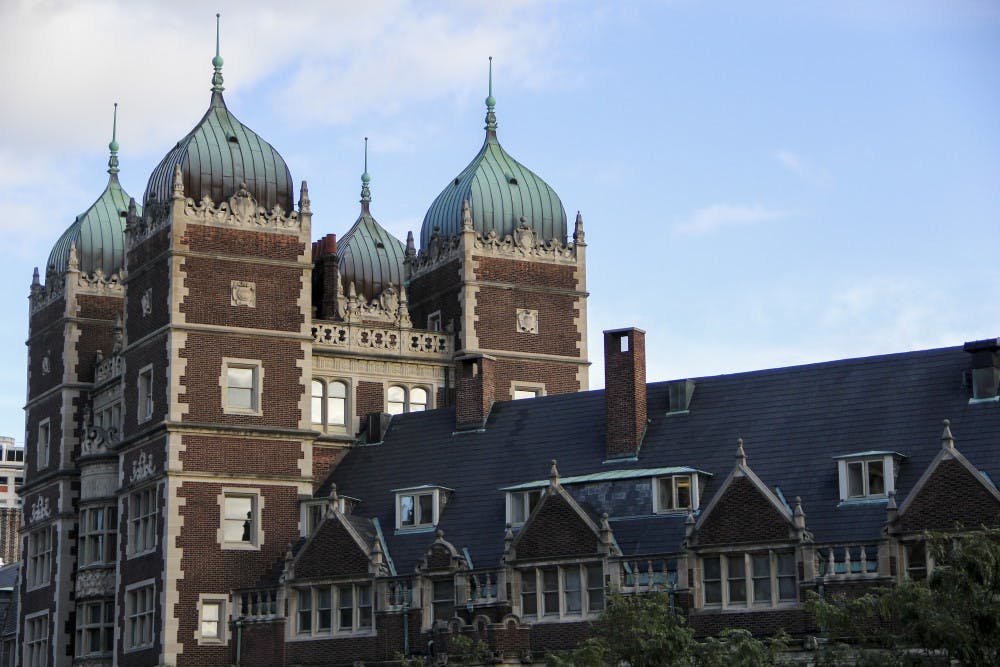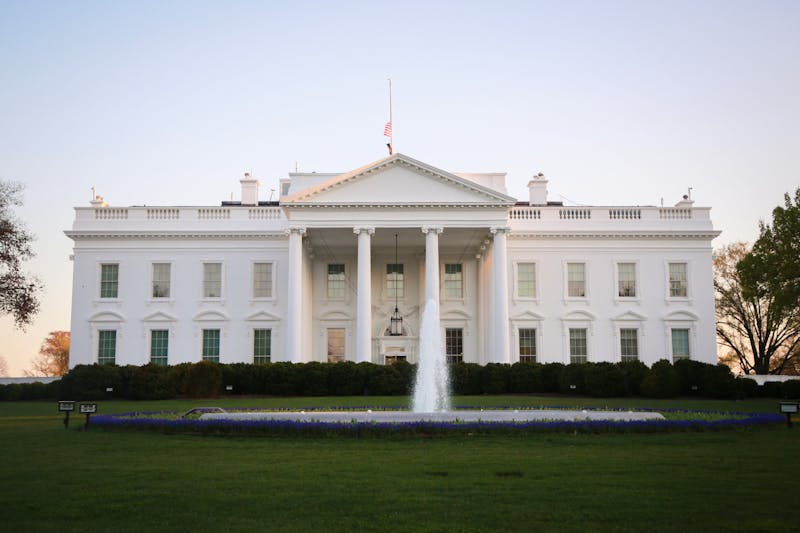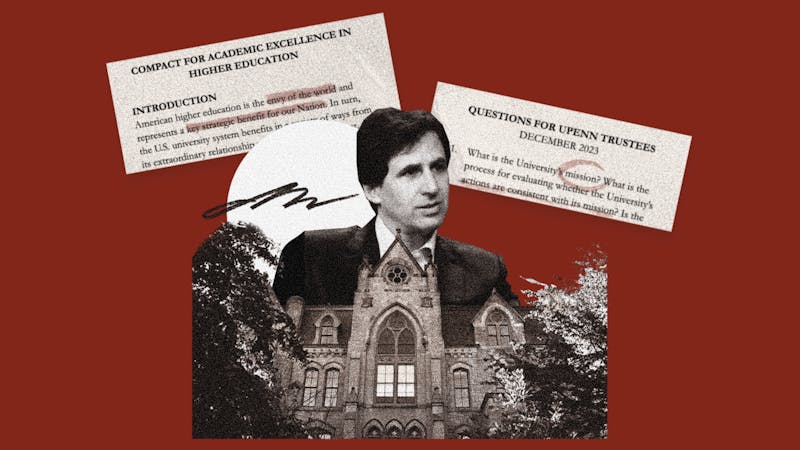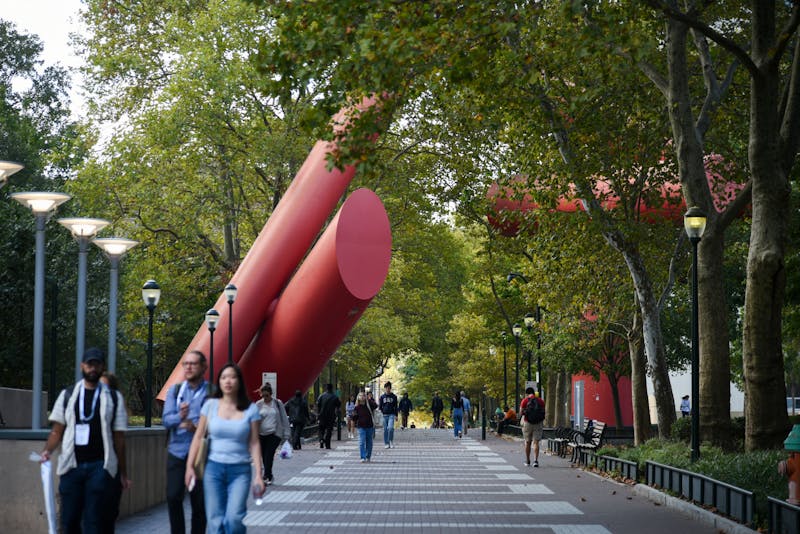
GROUP THINK is the DP’s round table section, where we throw a question at the columnists and see what answers stick. Read your favorite columnist, or read them all.
This week's question: Do you think Penn has a good atmosphere for free speech? Who is being (or not being) silenced? Who has too loud a voice?
Emily Hoeven | Growing Pains
I think Penn has a decently good atmosphere for free speech, but at the same time, there are clearly some ideas and voices that are more accepted than others. I have been in certain conversations where someone voiced an opinion (let's say a conservative political one) and then everyone looked at that person as if they were a complete imbecile.
It seems to me that there is a tendency within the student body to not even want to engage in dialogue with those whose opinions are known to deviate from what might be the more widely "accepted" opinion. The tolerance for deviation has generally gone down - one is either "on our side" or on "the complete other side." There is no belief in an in-between.
The idea of the omnipresent "standard" opinion or message is one that can particularly affect college campuses and that is particularly visible in its construction. What do you see walking down Locust Walk? Fraternity house after fraternity house. I don't know about you, but I would love to take a seminar class in one of those beautiful buildings, not have it belong to a single, often exclusive group that makes buying into or temporarily accepting its own culture a condition for entry. (This very well may be a topic for one of my future columns.) What else do you see walking down Locust Walk? People asking you to register to vote, while handing out fliers (exclusively) for Hillary. Both of these exhibit explicitly and implicitly the University's or the students' stances are on institutions and issues. Now, I am not at all a Trump advocate - quite the opposite, in fact. My point is merely that it is easy for one opinion, or one way of thinking, to be upheld both structurally and visually as the only one worth having - particularly on college campuses. As a woman, I am perhaps most conscious of things on campus that could affect my identity as a woman (i.e., frat culture ). I am sure, however, that other omnipresent opinions that we are not aware of are evident to different groups across campus. What we can and ought to do is to listen to those opinions, encourage their diversity , and try to understand that someone is not inherently a bad person for articulating a perspective that deviates from the status quo.
Alessandro van den Brink | Small Talk
I personally have never felt like my opinions are silenced, but I can’t speak for everyone on campus and I believe we should be incredibly sensitive to claims that certain groups are silenced Recently, many conservatives on campus have used the example of the backlash to the creation of a Pro-Life group at Penn as an example of conservative voices being silenced. At an overwhelmingly liberal university like Penn, I can sympathize with conservatives who struggle to find a receptive audience to their ideas. However, a free exchange of ideas does not mean that we must agree with everything. At times it has felt as though the conservative community at Penn has conflated silencing opinions with a rejection of those opinions. Anger towards a conservative idea is in itself an act of free speech, and while we should try to be respectful of viewpoints different from our own, we also must not be afraid to challenge ideas that we may take issue with. If anything, this can help make both viewpoints stronger and hopefully drive a productive dialogue across campus.
Jeremiah Keenan | Keen on the Truth
Penn has a green light rating from FIRE. To my knowledge, the administration has not weighed in to censor students for years. And so, as someone who believes in traditional (also known as negative) justice, I do not believe Penn hampers free speech. No-one is about to expel you for saying what you believe.
However, Penn does not necessarily have a good “atmosphere” for speech. This is not because people are unfree to say what they think, but because they are liable to be ridiculed and shunned for doing so. This fact – naturally a part of any environment with a monolithic worldview – is exacerbated by leftist tendencies to see those who disagree with them as evil rather than wrong, dangerous rather than misguided. This conviction leads many Penn students to attack the moral character of even the most polite suggestion of conservative ideas. (Consider the reaction to Eric Hoover’s recent pro-life statement on the Class of 2019 Facebook group, for instance.) The crowd-fueled vitriol that tends to result can make conservatives feel frightened and ostracized.
But this is not tantamount to suppressing free speech. It is simply the cost that any minority must pay when the majority have thoroughly embraced the notion that it is evil, not misguided.
Amy Chan | Chances Are
I think Penn gives lots of outlets for free speech, through the newspaper, through on campus protests, etc. However, because there are so many expressions of free speech, the Penn community almost becomes numb to them. We learn to tune them out because we feel like there is too much white noise. So, yes and no.
Harrison Glicklich | Good Luck
When people talk about a lack of free speech on college campuses, they neglect to mention that students can exercise free speech to disagree. When students post hundreds of comments online about how much they disagree with something, they are exercising their free speech and drawing attention to the issue with which they disagree. In many cases this gives a loud voice to fringe groups who claim they are being silenced. Take for instance the anti-gay preachers who recently visited campus.
They were very loud and provoked several reaction pieces in this paper. Unsurprisingly, reactions like these served to promote the ideology of these preachers, which would have otherwise remained relatively unknown to students on campus. The fact that Penn can be a home to that kind of vitriol, and that it has inadvertently promoted it, makes me wonder where complaints about a lack of free speech are coming from. We are having this conversation because a student hoping to form an anti-abortion group on campus has been confronted for his opinions. Unsurprisingly, many students were hostile to the formation of a group with ties to an institution that thinks abortion should be made illegal. Now the DP has picked up the story and more people know about it than ever. I am hard-pressed to think his opinion is being silenced.
To me, this does not sound like a problem with free speech as much as a problem with people not accepting his ideas. This remains an issue for people with opinions that deviate from the norm. That being said, I think that we are a community of reasonable people, and that a reasonable idea could win us over. We're waiting.
Aaron Cooper | Aanarchy
I see free speech at Penn as less of a marketplace of ideas and more of a natural battleground. Each voice on campus is tied to an ideology and a set of personal interests, an image of what they want to see Penn and its culture to look like. Swaying the hearts and minds of faculty and students is always servant to those interests, and free speech is a foundation by which Penn can naturally respond to the motives carried in those voices.
At the end of the day I think Penn's atmosphere toward free speech is pretty good. Ironically, that does often involve people being silenced. When conservative speakers are dis-invited from events or liberal students are pressured from the public stage that's free speech in action. The natural ideological conflict that we enact without voices comes to natural conclusions in the form of of direct action, and the public will is exerted in a natural form. An artificially preserved bubble of discourse is idealistic, but faulty. In the wider world all people and ideologies won't get a chance at the podium. Our voices being heard will be reliant on our ability to organize and focus them.
Amanda Reid | Reid About It!
At Penn, free speech is the easiest thing people can have a view about without actually needing to consider anything outside themselves. Everyone acknowledges it exists, everyone has an opinion about it, and when it crops up, everyone makes their opinion, regardless of how free it is, known. From this, the idea of free speech devolves into politicized mad lib debating (fill in [blank] with whatever issue rouses you, and I guarantee you can tie it back to free speech).
As a technicality, free speech exists. We can protest on campus, we can hang signs, and we can create public performances. Even if posters get taken down, surely the will to put them up demonstrates a certain freedom. But the Penn community does not publicly acknowledge the separate quadrants in which free speech proliferates. For instance, can a a conservative viewpoint really be made confidently at a Penn Dems meeting? In an all-white classroom, can a non-white voice really speak up confidently without the feeling of not belonging? Regardless of how much free speech is held up as a pillar by which we stand and measure all our opinions, we can agree that some spaces do not value your speech. Even if it’s free.
Coming from Vietnam, a country where free speech doesn’t exist, I am both proud and disappointed. Disappointed because we take free speech for granted, because our social customs don’t exactly encourage it to proliferate, and because we all believe we know how free speech works when really we don’t. But I’m proud because miraculously, I can exist in a world where the sign “Buttsex = Heaven, Ignorance = Hell” can come into play.
James Lee | The Conversation
There are two ways of thinking about this. First, we can think about whether Penn has any institutional barriers to free speech in terms of regulations or practices. Penn hasn’t really taken a stance on trigger words or safe spaces, so I wouldn’t say they’ve intervened in this regard. Another thing that must be considered, and is more difficult to talk about, is whether there are social forces or cultures at Penn that while not publicly acknowledged discourage certain students from talking about certain things. This is probably not something that is felt unless one has personally encountered it, so I can only speak about my own experiences. I have not felt this. The recent discussions around rape culture at Penn as well as the continuing dialogue on race relations seem to signify that people feel comfortable enough (or disturbed enough, depending on interpretation) to bring such sensitive topics to light. And let’s face it: Penn let me have a column, so it seems pretty open to letting anyone talk about anything.
Alec Ward | Fair Enough
On the whole, Penn’s atmosphere is, I think, pretty friendly to free speech. The school’s strong Policy on Open Expression guarantees broad expressive rights to students, faculty, and visitors, and the unique Open Expression Monitoring program — when it works — is effective at protecting them. Last year’s shout-down of CIA Director John Brennan was highly unfortunate, but represented more a failure of the system to work properly — the event organizers hadn’t requested Open Expression Monitor presence — than a structural hostility to free speech generally. My strong sense is that VPUL, the administrative unit in the best position to uphold or suppress expressive rights, is strongly in favor of keeping Penn a speech-friendly campus. The kind of Kafka-esque investigation and punishment of student and faculty speech which is routine at many peer institutions just doesn’t seem to happen here. Neither has Penn joined the disturbing trend of setting up “Bias Response Teams” to police expressive activity on campus. That the speech-punitive Greek Community Judicial Board proposal of a few years ago was quashed, and that anti-gay preachers have twice now been tolerated to come preach their distasteful and deeply unpopular ideology are, in my eyes, positive indications of Penn’s institutional attitudes toward speech.
As regards the student culture, it’s important to draw lines between free speech and speech-tolerance. Certainly, students who voice unpopular opinions face harsh and massed criticism, but that’s the essence of free speech, not the death of it. So long as minorities of all types are able to have their say without being suppressed beforehand or punished afterwards, I don’t view it as terrifically consequential to free speech how well or badly they’re received. Viewpoint diversity, though important, is a mostly separate issue from free speech, and I think it’s a mistake to claim that receiving intense social or intellectual backlash for what one says is equivalent to censorship or other free speech violations. Speech can cost a person friendship, reputation, even employment, and that’s OK — those relationships aren’t premised on guarantees of free speech. The relationship between student or faculty and university, however, is, and Penn has done a good job keeping it that way, at least for now.
The Daily Pennsylvanian is an independent, student-run newspaper. Please consider making a donation to support the coverage that shapes the University. Your generosity ensures a future of strong journalism at Penn.
Donate






